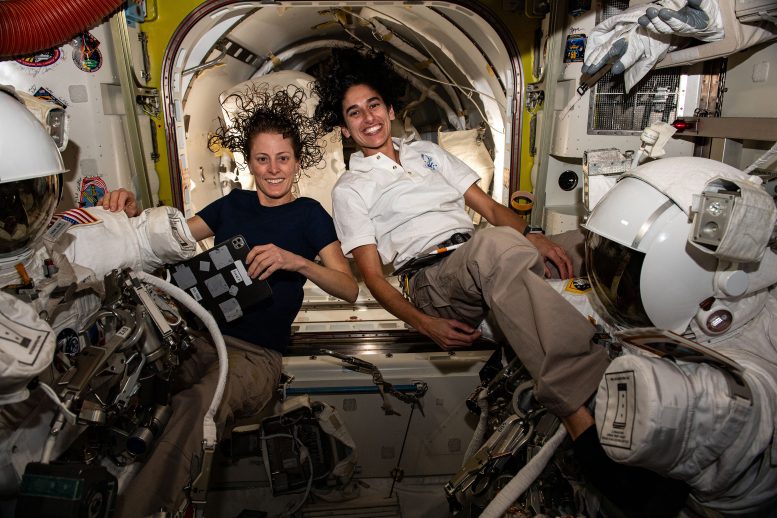The SpaceX Dragon Freedom spacecraft carrying the four-member Axiom Mission 3 (Ax-3) crew is pictured on January 20 approaching the International Space Station 260 miles above southern India. Credit: NASA
Biomedical science and advanced technology topped the research schedule for the 11 crew members representing Expedition 70 and Axiom Mission 3 (Ax-3). The International Space Station (ISS) residents are also gearing up for the arrival of a U.S. cargo craft next week.
Advances in Cancer Research and Space Botany
Cancer research and space botany were the focus of Wednesday’s biology work as the Ax-3 crew continued its busy space science schedule. Pilot Walter Villadei observed cancerous cell cultures inside the Kermit microscope to understand how microgravity conditions such as radiation affect cancer growth. Mission Specialist Alper Gezeravcı processed microbe samples growing in petri dishes for a study exploring using propolis, a natural antibacterial agent, on space station surfaces. Both experiments seek to improve health on Earth and in space.
Robotics and Remote Control Experiments
Robotics is an important part of the Ax-3 science mission as Mission Specialist Marcus Wandt tested remotely controlling robots on Earth from the space station. The Surface Avatar study explores the orbit-to-ground control of robots that may inform future missions on Mars or asteroids. Commander and former NASA astronaut Michael López-Alegría assisted his Ax-3 crewmates throughout the day while also servicing a variety of life support hardware onboard the orbiting lab.

Glaciers in the southern Andes emptying into Lago Argentino are pictured from the International Space Station as it orbited 270 miles above. Cerro Pietrobelli, a mountain on the southern Chile-Argentina border (left center), is also seen from the orbital outpost. Credit: NASA
Mental Health and Supportive Technologies in Space
Station Commander Andreas Mogensen of ESA (European Space Agency) kicked off his day watching a virtual reality movie exploring VR’s potential to sustain mental health during long duration missions. He later set up the Kermit microscope and the Life Science Glovebox to support Ax-3 research. Flight Engineer Satoshi Furukawa from JAXA (Japan Aerospace Exploration Agency) turned off and stowed the Kermit microscope at the end of the Ax-3 cancer study. He also assisted NASA Flight Engineer Loral O’Hara cleaning cooling loops inside a pair of U.S. spacesuits.
Preparations for Cygnus Spacecraft Arrival
O’Hara joined NASA Flight Engineer Jasmin Moghbeli at the end of the day and practiced on a computer capturing Northrop Grumman’s Cygnus space freighter with the Canadarm2 robotic arm. Cygnus is due to launch early next week and arrive a day-and-a-half later when Moghbeli will command the Canadarm2 to capture Cygnus as O’Hara monitors its arrival. Moghbeli spent most of Wednesday swapping out station science hardware.

Expedition 70 Flight Engineers (from left) Loral O’Hara and Jasmin Moghbeli, both NASA astronauts, pose for a portrait while installing helmet lights on spacesuits and checking the functionality of their spacesuit’s components. Credit: NASA
Roscosmos Science Tasks and Cardiac Study
The orbital outpost’s three cosmonauts remained focused on their list of Roscosmos science tasks. Veteran cosmonaut Oleg Kononenko strapped sensors to himself measuring his heart activity in microgravity for a long-running cardiac study. Flight Engineer Nikolai Chub explored futuristic robotic and spacecraft piloting techniques on a computer that may inform planetary missions. Flight Engineer Konstantin Borisov swapped out a lens on a camera pointed toward Earth and then participated in a space digestion study with Chub. At the end of the day, Borisov scanned Chub’s optical nerve, retina, and cornea using standard medical imaging hardware found on Earth.
Upcoming SpaceX Crew-8 Mission Briefings
At 1 p.m. EST on Thursday, mission managers on NASA TV will discuss the upcoming SpaceX Crew-8 mission to the space station. Following that, at 2:30 p.m. the SpaceX Crew-8 mission members will introduce themselves as they count down to launch next month.
Both news conferences will be available on the NASA+ streaming service via the web or NASA app, and will air live on NASA Television, the NASA app, YouTube, and the agency’s website. Learn how to stream NASA TV through a variety of platforms including social media.




